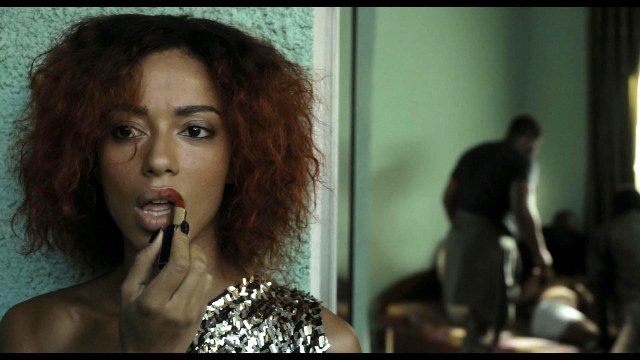Viva Riva is about gang war! It stems from a fuel shortage in DR Congo and lo and behold, it never runs out of gas. Djo Munga captures the vibe of the gratuitous torturing violence and sweaty, ass-oriented sex scenes and the expertly energized genre with a mixture of carpe diem and self-destructive instinct.
Viva Riva does inject a much-needed dose of excitement and unpredictability into African Cinema.
Many more elements combine to give Viva Riva a tone that is a cynic’s dispassionate amusement rather than a self-righteous moral outrage. Djo Tunda wa Munga’s flamboyant style, especially in representing sex and violence, has a likeness to Fernando Meirelles’ City of God (2002). Although, Munga directs with a different oomph that gives the film a less frantic and disturbing beat.
As a result of the gas shortages in the Congo (which makes those that can import it, by any means, kingpins as far as life in the capital Kinshasa goes) gangster Riva (Patsha Bay Mukuna) pounces on the opportunity and makes a fast buck from stealing truckloads of gas from his Angolan boss Cesar (Hoji Fortuna). With a king’s ransom in fuel, a fat bankroll and his sights set on the best the city has to offer, he returns to his hometown Mariano although a lot of people are looking for him. But he’s only set on looking for a good time. And there’s your movie!
Amidst the boozing, clubbing and whoring spree, while cruising with old pal J.M., he has the hots for Nora (Manie Malone) who’s the moll of tough, porn-junkie local kingpin Azor. Meanwhile, Cesar pulls out all stops to find Riva, with the reluctant assistance of the Commandant (Marlene Longage) and her lover lady Malou.
This rhetoric on nepotism in Central Africa (a legacy of colonialism and of the civil war) combines with the strain of poverty to provide a rich background to the story. Munga makes no apologies about the strained relations between the DR Congo and neighboring Angola. As Cesar retorts in the middle of the film, “Your country is shit. It would have been better to stay colonized”. This is a theme that Viva Riva hammers home in between killings. By so doing Munga exposes his society’s well-oiled corruption machinery, barring the erotic scenes that are flamingly explicit (and acrobatic) even by western standards, or the brutality and gore that are equal matches for Korean revenge films.
The films few tender moments emerge when Riva begins to recognize his own pain in others. In the end the story spins off into one about broken people abusing other broken people in an attempt to survive. It is a film about ambition that may, for all the trouble that goes with it, be what is needed to create a better future. By structuring itself against these real world problems, Viva Riva eschews escapism and delivers something much more potent – yet it does so with style.
Additionally, minor characters are beautifully drawn. The female characters show a depth and complexity rarely seen in this genre. Casual misogyny is a cause for escalating tension in Viva Riva – there is always the feeling that, sooner or later, one of these women is going to snap. But Nora comes across as a real person with strong sexual urges of her own. She enjoys the sex to an extent that it challenges Western ideas about African sexuality. Moreover, two lesbian characters, very different from each other, prove to be every bit as capable and as vulnerable as the men!
Djo Munga’s spirited cast and busy plot speak tons about his technical sophistication. The Cinematography is slick, furnishing the protagonists’ extravagant costumes with sensuous, saturated colors, such as Nora’s sequined-gown which shimmers in various colors as a metaphor for her chameleon personality.
This film has been unfairly compared to the films of Tony Scott. But it’s much better! With fast paced action, unflinching brutality, not a hint of soft focus apologism, a complex plot with convincing 3-D characters, the music, which is a mixture of first rate dance numbers and low humming percussive scores to intimate impending danger, only add to make it enticing.
It’s one of the most exciting contributions to the genre for years. For African cinema, a bold step in the right direction.
[sws_red_box box_size=”580″]Director: Djo Munga
Writer: Djo Munga (screenplay)
Stars: Patsha Bay, Manie Malone and Hoji Fortuna[/sws_red_box]











I look forward to seeing this sometime.
I finally saw this movie and I didn’t really like it. I think for an African movie the sex scenes are a bit too much. They were uncalled for and seriously inserted to draw attention to the movie.
I had read from the Socrates Sarfo porno review on this blog earlier about how there’s not an industry in sub-Saharan Africa for porn, except for South Africa. I believe this is making it possible for average movies like Viva Riva to sell by showing explicit sexual material.
Articles like this just make me want to visit your wsbetie even more.